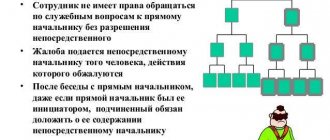Hello! In this article we will tell you everything about being late for work.
Today you will learn:
- What is considered late?
- How is being late different from absenteeism?
- What sanctions can be applied to an employee for non-compliance with labor discipline.
- Instructions for dismissing an employee for being late.
What is considered late for work?
When a person is at the workplace, he is obliged to obey the charter of the enterprise and the work schedule. An employee does not have the right to come to work whenever he wants (exception if the position provides for a flexible schedule).
Some irresponsible employees believe that being a little late will not entail any consequences. But this is a misconception. First, let's figure out what is considered late.
Lateness is the absence of an employee from the workplace for any reason from 1 minute to 4 hours.
Some managers allow employees to be late by up to 5 or 15 minutes. But this is at the discretion of the authorities. However, if such violations are systematic, then sooner or later the employer will get tired of such negligent attitude towards labor regulations.
The Labor Code says nothing about the concept of “lateness”. It is called differently - violation of discipline.
Let's look at examples of delays:
- Absence of an employee at the beginning of the working day;
- Late return of the employee from lunch break;
- Leaving the workplace on your own initiative without warning anyone;
- An employee leaving work before the end of the working day.
When hired, each employee signs an employment contract, which spells out all the rules of the enterprise and the daily work schedule.
If this agreement does not contain a clause on lateness, or the employee for some reason was not familiarized in writing with the rules of being in the workplace, he cannot be held accountable. Otherwise, he can go to court.
What counts?
It is necessary to combat the lack of punctuality of employees, because it is directly related to labor productivity in the organization. However, to understand how to punish such a disciplinary offense, you first need to decide what it is.
Lateness is considered to be an employee’s failure to arrive at work on time. It is not an independent regulatory category, therefore the enterprise has the right to set its time period at its discretion.
According to Article 81, an employer can immediately dismiss an employee for absenteeism - absence from work for four hours or more. We can conclude that being late is considered a situation when an employee is absent from his assigned place for less than four hours.
In order to accuse a person of non-compliance with labor discipline, when hiring him, he must be familiar with the internal regulations of the organization against receipt.
If constant travel is an integral part of the job, it is necessary to determine in advance in the job description the time that the employee will use for personal purposes, for travel and for performing official duties.
All nuances about an employee’s late appearance at work must be documented, otherwise in the event of a dispute, he will be legally correct. This may happen if the proceedings go to court.
Late for a valid reason
If you are a strict manager and notice that your subordinate is absent from the workplace, do not rush to punish him. First, you need to figure out what caused the delay, because force majeure circumstances happen in the life of any person.
Not every person can be punished for being late. Such violations are divided into lateness for a valid reason and for an unexcused one.
Valid reasons:
- Employee illness;
- Illness of his relatives and close people (for example, a child);
- Death of one of the relatives;
- Natural disasters, accidents, etc.
Any lateness for a valid reason must be documented. This could be sick leave or other medical certificates.
If you were flooded by your neighbors, then a certificate from the housing office; if you were in a car accident, a certificate from the traffic police; if the fault was due to broken public transport, a certificate from the motor vehicle transport service that services this route.
A traffic jam is not considered late for a valid reason.
What should an employee do if he is late?
You can explain being late and try to smooth the situation over.
Every employee has faced a situation where it is not possible to get to work on time. What needs to be done to reduce penalties to a minimum or avoid punishment altogether? Possible sequence of actions:
- It is highly advisable to notify your immediate superiors about the delay and explain the reasons. Even if they are disrespectful (overslept, got stuck in a traffic jam, etc.), management can be understanding and do without a reprimand. In any case, it is better to warn than to hope that no one will notice your absence.
- If the reason for being late is valid, it must be documented. If you felt unwell and went to the clinic, you will need a certificate from a doctor; if you were in an accident, you will need a certificate from the traffic police. If there was a utility accident at home, you will subsequently need to obtain a certificate from the housing office and present it at work as a supporting document.
- Write an explanatory note. This document is written at the request of management and gives the employee the opportunity to speak out and explain all the reasons for the misconduct. The explanatory note itself is not an exculpatory document; it must be accompanied by evidence of valid reasons.
What should you never do? Firstly, it is extremely undesirable to lie. If the relationship with your superiors is good, it is better to name the true reason for being late and promise not to allow this to happen again, rather than childishly invent non-existent circumstances. Secondly, it is better not to try to falsify doctor's certificates and other documents to justify oneself. This will not improve the situation, but will only worsen it, since management can easily verify the authenticity of any document if doubt arises.
If it turns out that an employee used a fake certificate, he will most likely be fired. In addition, criminal prosecution awaits the doctor or police officer who issued the forged document. In order not to complicate life for yourself and others, it is better to refuse unnecessary risks.
What is the difference between being late and absenteeism?
Sometimes managers mistakenly assume that being late and absenteeism are the same thing. But that's not true.
Let's look at the main differences in the table.
| Criteria | Late | Absenteeism |
| Classification | Violation | Serious violation |
| Time frame | Absence of an employee from his workplace from 1 minute to 4 hours | Absence from work or absence without notifying superiors for 4 hours or more |
| Punishment | Reprimand, reprimand, dismissal (you cannot be fired for one delay) | 1 absence = dismissal |
| Where is it fixed? | In the access system (if there is one) | On the time sheet |
| Design features | An explanatory note, an act of lateness, an order for collection are drawn up | The manager has the right not to demand explanations from the violator and not to draw up any acts. He can issue an order on his own initiative and dismiss the employee |
What can an employee be punished for?
There are no gradations of reasons for the duration of absence from the workplace, just as there are no such concepts about systematic tardiness. Any violations of this kind are considered disciplinary offenses.
If a subordinate fails to provide documentation that demonstrates good cause, management may impose certain sanctions. First, they make a reprimand, then they issue a reprimand, and if the offense is committed again, this is followed by dismissal under Article 192 of the Labor Code. However, you can also be fired due to a single delay of more than four hours.
It follows from this that someone who is late three times by a few minutes is formally subject to more serious sanctions when compared with someone who was late only once, but by a couple of hours. For the first, the violation will be repeated, which may lead to dismissal, and for the second, despite a long absence, the sanction may be a reprimand or even a reprimand, since the legal limit of four hours has not been exceeded.
But this does not mean that the head of the organization can arbitrarily apply penalties. The law requires guidance to weigh the seriousness of the offense against the resulting punishment.
Punishment for being late
Being late is not considered a serious violation, so punishment can only be disciplinary.
These include:
- Note – if the employee was late once;
- Reprimand – 2 or more latenesses;
- Severe reprimand – delays are systematic;
- Dismissal – regular lateness (3 times or more).
If the reason for being late was valid, and the employee has documented this, then no punishment will be imposed.
For 1 such violation, one disciplinary sanction is provided. The manager can apply punishment within 6 months after the violation. All penalties are canceled after 1 year.
If an employee has been reprimanded for a violation, the manager may remove it before the 12-month period, provided that this does not happen again.
The manager may impose a fine or reduce wages for lateness. This is contrary to the Employment Agreement. If this is allowed at an enterprise, then management may be held administratively liable.
Punishment
In Russia there is a myth that it is possible to be late for work within 15 minutes. Allegedly, this is not recorded or punished in any way. However, if the company adheres to a strict daily routine and values punctuality, even showing up at work a few minutes later than the specified time is fraught with litigation.
The Labor Code has several options for influencing unpunctual workers:
- comment;
- rebuke;
- dismissal.
Each method is used depending on the specifics of a particular case. Obviously, no one is going to fire a qualified specialist for being late once. It is illegal.
One time a reprimand is made, two times a reprimand. If an employee is regularly late, the employer has every right to terminate his employment contract (Article 192).
The Labor Code applies the wording “the employer has the right” to these measures. This means that the actions are advisory and not mandatory. In other words, management has the right to decide for itself whether to punish an employee or leave a disciplinary offense without attention.
It is important to remember that the Labor Code does not provide for the application of penalties due to lateness. If a boss uses such a method, he faces administrative liability.
In this case, the employee can be deprived of a bonus for being late if this measure is provided for in the employment contract.
Step-by-step instructions for dismissal for being late
According to the Labor Code of the Russian Federation, it is impossible to fire an employee for one delay. If an employee systematically violates labor discipline, the manager has the right to dismiss the negligent employee on his own initiative in accordance with Article 192 of the Labor Code of the Russian Federation.
The sequence of actions in this case is as follows:
- When the employee is late for the first time, he is obliged to write an explanatory note, where he will state the reason for his action and attach the available certificates to the document. This must be done within 48 hours.
- If within 2 days the employee does not provide the appropriate note and refuses any explanations, a Statement of Refusal of Explanations is drawn up in the presence of 3 witnesses.
- If the reason is not valid, then a lateness report is drawn up. This document must be signed by 2 witnesses who confirm the fact of the violation.
- If the violation is identified by the head of the unit, who does not have the right to impose a penalty, he writes a report addressed to his management and attaches the necessary documents.
- After this, the head of the company sets a date and time for the analysis, where all involved persons are invited.
- Based on the drawn up act and the analysis carried out, the enterprise issues an order, which will indicate the sanctions applied to the violator.
- After this, it is necessary to familiarize the employee to whom the penalty is being applied with the order. If an employee refuses to sign an order, then a corresponding act is drawn up and signed by 3 witnesses.
- The second delay is processed in the same way as the first.
- If the employee is late for the third time, the manager may fire the employee on his own initiative. In this case, the following reason should be indicated in the work book: “Systematic violation of labor discipline.”
Question: Is an employee required to come to work early?
But, in accordance with Article 99 of the Labor Code of the Russian Federation, under normal conditions, involvement in overtime work is allowed only with the written consent of employees. And a signature stating that the employee is familiar with the PVTR will not mean such consent.
In accordance with Art. 91 of the Labor Code of the Russian Federation, working time is the time during which an employee must perform his job duties, as well as other periods of time that, in accordance with laws and other regulatory legal acts, relate to working time. Thus, working time is the time actually worked by the employee, as well as the time when the employee did not actually perform his direct duties, but was at the disposal of the employer. Other periods classified as working time are, in particular: downtime (temporary suspension of work for reasons of an economic, technological, technical or organizational nature - part 3 of article 72.2 of the Labor Code of the Russian Federation); breaks during the working day (shift) provided to women for feeding their children (Article 258 of the Labor Code of the Russian Federation); meal time at the place of work, if, according to production conditions, it is impossible to establish a break for rest and food (Part 3 of Article 108 of the Labor Code of the Russian Federation), etc.
We recommend reading: How to find the owner of a garage by address
Mistakes that managers can make when trying to quit
Before dismissing an employee, the manager must understand that violators sometimes disagree with the employer's decision. They go to defend their rights in court.
If management acted within the framework of the Labor Code, then the court will be on the side of the employer. If an employee proves the illegality of the actions committed against him, he will have to be reinstated at the enterprise.
Let's look at the main mistakes that managers make when dismissing someone for being late:
- The employee was fired after being late for 2 times, but there was no written confirmation of the first violation (it was not documented);
- The employee was late 2 times, but only one was for an unexcused reason;
- If the period between two delays was more than 12 months;
- The employer summed up all the employee’s tardiness and called this violation absenteeism;
- There were 2 violations, but no penalty was imposed for one of them.
How can you avoid
It is important for the employer to treat each employee equally. If you don’t pay attention to one person being late, soon the whole team will start coming to work ten minutes later than the scheduled time.
At the same time, the same rules exist for management - if the boss is regularly half an hour late, it is not surprising that the employees will not rush to start the working day.
The easiest way for an employee to avoid conflict situations with management is to come to work 5 or 10 minutes before the start of working hours. If you cannot avoid being late, you should warn your colleague or your boss directly.
Often the cause of the conflict is not the fact of being late, but the fact that management was not warned where the employee was and when he would appear. If you report lateness in advance and do not do it regularly, litigation can be avoided.
Is an employee required to come to work early?
1. try to explain to the manager that he is “a little” wrong, referring to the relevant legislative acts; 2. contact the representative of the primary trade union organization in the unit; 3. Contact the Directorate for Personnel Management and Regional Policy, or the Head of the Human Resources Department, or the Director for PP and RP.
But even if written consent is received from the employee, the employer will have to pay for these 50 minutes per week in accordance with Art. 152 of the Labor Code of the Russian Federation: “Overtime work is paid for the first two hours of work at least one and a half times the rate, for subsequent hours - at least double the rate. Specific amounts of payment for overtime work may be determined by a collective agreement, local regulations or an employment contract. At the employee’s request, overtime work, instead of increased pay, can be compensated by providing additional rest time, but not less than the time worked overtime.”
Can an employer require you to come to work 10 minutes before the start of the working day?
I'm an office worker. My employer refers to the fact that it is necessary to prepare the place before work begins (turn on the computer, etc.) 5 minutes is enough for me, but he demands to come earlier. Is this legal? Olga
I said a hundred, this is not legal. It is clear that time is needed to prepare for work and the employment contract provides for working hours, but preparation for work is also work if you take a philosophical approach. None of the laws oblige the employee to appear in advance
What should a fitness club administrator be like?
Whatever questions you have, you always go to the reception administrator. What services does the club provide? vacation time. The administrator has literally any information that may interest you.
It "deserves effort on the part of gym administrators to retain their services." By agreement with the office, Palma's departure was due to an organizational restructuring at the gym. The facilitator position played by the teacher was eliminated. Milagro Rodríguez, the recreation area coordinator, took over these functions effective July 1st.
We recommend reading: What assistance is available to young families in the Irkutsk region in 2021






